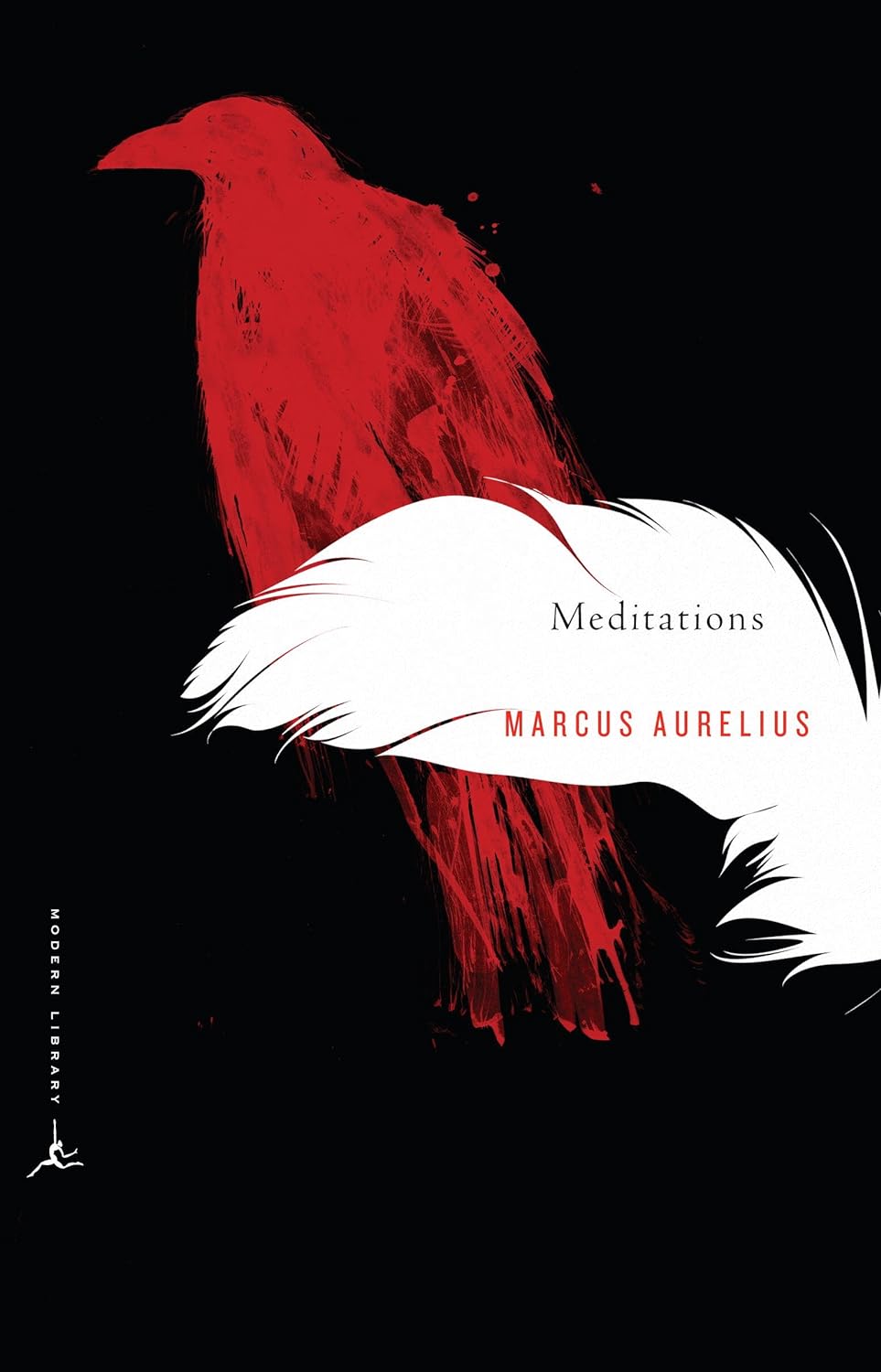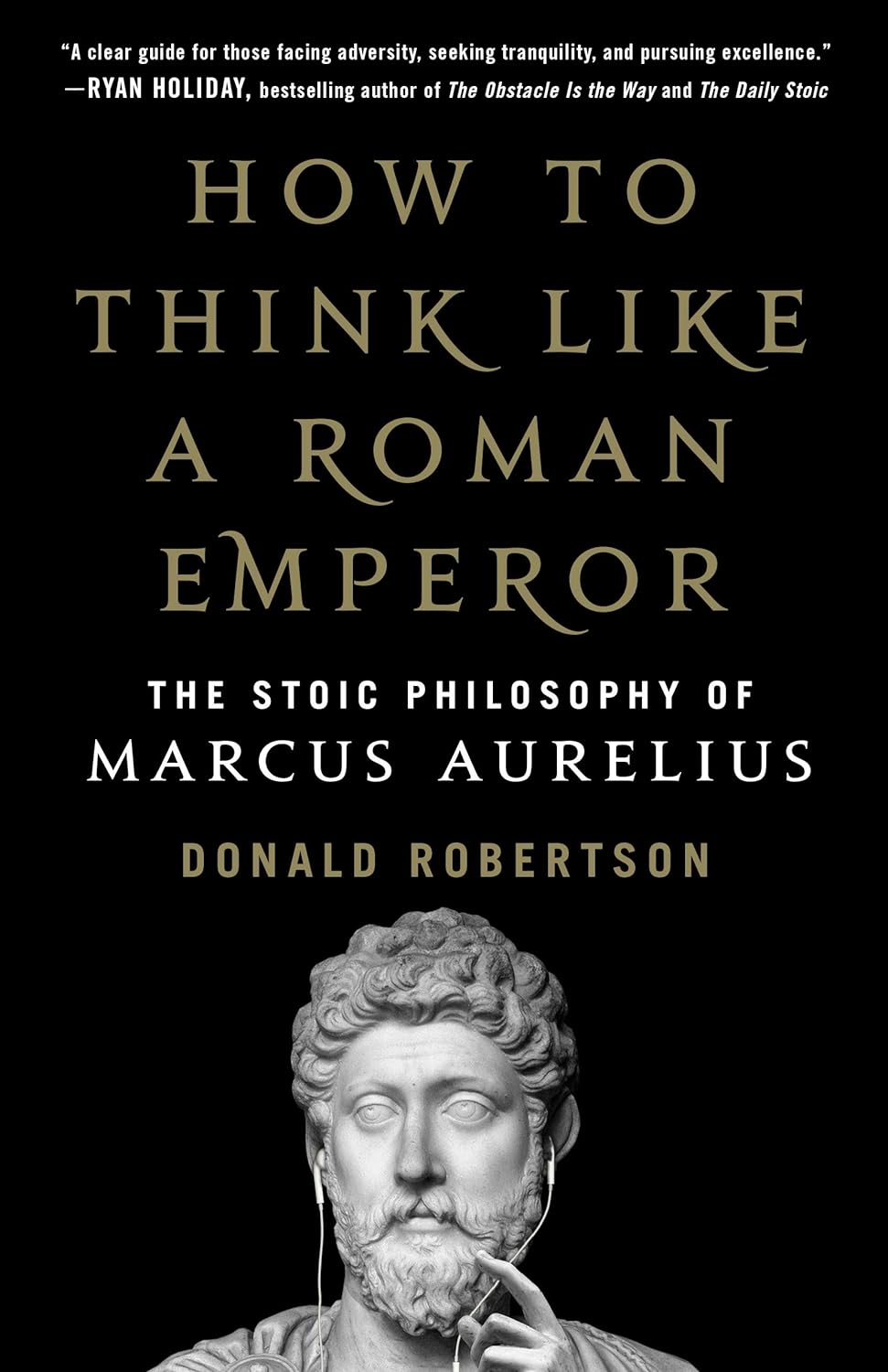Meditations by Marcus Aurelius: Book Summary, Key Lessons and Best Quotes
Discover the no-nonsense wisdom of Marcus Aurelius's Meditations. This post breaks down Aurelius's Stoic philosophy with an honest, real-world spin on self-discipline, resilience, and embracing hardship.

Jon High
·
Nov 5, 2024
Meditations by Marcus Aurelius: A Brutally Honest Guide to Stoic Wisdom
Ever met someone who talks about “being happy” like it’s some all-you-can-eat buffet that’s just waiting to serve you up a plate of bliss? Yeah, Marcus Aurelius wasn’t that guy. Meditations isn’t some feel-good bedtime story. It’s more like a cold splash of water straight to the face—a reminder that life is full of crap and the sooner you accept it, the better off you’ll be.
Aurelius’s work is raw, real, and somehow still manages to slap you with ancient wisdom that feels like it was written for us today. So, let’s break down some of his biggest Stoic lessons and see how they might actually help us deal with life, rather than just wishing it was better.
1. Life Is Painful. Get Over It.
Aurelius’s life? Not exactly what you’d call a stress-free paradise. The guy was dealing with wars, plagues, betrayals—you know, the usual Tuesday. But his approach? He didn’t whine about it. He actually viewed life’s difficulties as training ground, a chance to grow. In one of his most famous lines, he said, “The impediment to action advances action. What stands in the way becomes the way.”
Translation: Life is hard. If you’re waiting for it to magically become easier, good luck. The sooner you accept that pain is a given, the sooner you can stop trying to dodge it and start using it. Pain, in his book, is the catalyst for strength. Complaining just means you’re wasting your energy on resisting something that’s not going anywhere.
2. Control Your Mind, Not the World
We’re all about control—controlling our careers, our relationships, heck, even our coffee orders. But Meditations isn’t interested in helping you keep every detail of your life exactly as you want it. Aurelius’s view is that most of life is actually out of our hands. The only thing we can truly control? Our reactions.
He believed that our minds hold ultimate power. How we think about things directly impacts how much they can hurt or help us. “You have power over your mind—not outside events. Realize this, and you will find strength.” Now, that might sound all warm and fuzzy, but remember, this isn’t about wishful thinking. It’s about cold, hard, disciplined thinking. It’s a choice every day: be calm or lose it. Your choice.
Actionable Takeaway: Practice controlling your thoughts instead of letting them control you. Start seeing every uncomfortable situation as a chance to try it out. Work is a mess? Fine. Family driving you nuts? Another opportunity. Nothing says Stoic strength like learning to keep your head on straight while the world goes sideways.
3. Death and Loss: The Only Certainties
Ever had that moment when you look around and think, “What’s the point?” Well, Aurelius was way ahead of you. Death and loss are two things he thought about constantly. Not because he was a downer but because he saw death as a lens to value life’s fleeting moments.
One of his most direct lines? “You could leave life right now. Let that determine what you do and say and think.” He wasn’t about avoiding loss but leaning into it. Aurelius knew that everything—our time, relationships, and the people around us—are on borrowed time. So, while our culture today tells you to hold on and accumulate, he’d tell you to remember that none of it’s really ours to keep.
How to Apply It: Instead of obsessing over what you could lose, appreciate it while you have it. Nothing’s permanent, and that’s okay. Once you’re on board with that, you stop clinging to people, outcomes, or situations that just aren’t working. You start to live without the pressure of trying to make everything perfect.
4. Stop Playing the Victim: Own Your Choices
Aurelius was big on the idea of responsibility, particularly when it came to our own lives. He didn’t have time for people who wanted to blame their circumstances on everyone else. “Waste no more time arguing what a good man should be. Be one.” This isn’t about waiting for life to improve or some cosmic force to grant you happiness. It’s about you.
Blaming others for your situation? That’s your choice. Complaining about how unfair everything is? Again, that’s on you. Aurelius’s Stoic approach? Cut the excuses and take full ownership of where you’re at.
Real Talk: Start paying attention to the ways you pass off responsibility. If you’re serious about getting your life together, stop waiting for an ideal situation. Start acting in line with the person you want to be, right now, regardless of what’s in your way.
5. Practice Self-Discipline Like a Boss
Meditations is one long exercise in self-discipline. For Aurelius, discipline wasn’t just about getting up early and lifting weights. It was about taking ownership of everything: your time, your emotions, your reactions. “It is not death that a man should fear, but he should fear never beginning to live.”
To him, every decision was an opportunity to live by his principles, even when no one was watching. If he got lazy, it was on him. If he let anger take control, it was his failure. This wasn’t self-punishment; it was a refusal to let anything or anyone else dictate his state of mind.
Takeaway for Us Today: Practice staying disciplined even when no one else is around to see it. Quit looking for motivation from outside sources. Strengthening that internal drive means you’re no longer dependent on fleeting inspiration or validation. It’s not glamorous, but it’s solid.
Final Thoughts: Why Meditations Still Matters
Marcus Aurelius’s Meditations isn’t exactly light reading, and it sure doesn’t cater to our culture’s obsession with comfort and ease. But maybe that’s why it’s still a classic. It’s a wake-up call, a reminder that if you want to build a life worth living, you’re going to have to get comfortable with being uncomfortable.
This Stoic approach to life is all about discipline, perspective, and accepting pain as part of the journey. Aurelius didn’t ask us to change the world; he asked us to change ourselves. And honestly? That’s probably the tougher assignment.
In-Depth Summary
Summary
"Meditations" by Marcus Aurelius is a series of personal writings by the Roman Emperor that serve as a guide to his philosophy of life. Written in Greek, these reflections and exercises offer insights into Stoic philosophy, focusing on personal ethics, self-discipline, and the pursuit of virtue. Aurelius's writings are timeless, providing practical wisdom on how to live a life of integrity, inner peace, and resilience in the face of adversity.
The Essence (80/20)
The core message of "Meditations" is the importance of self-reflection and the cultivation of inner virtue. Marcus Aurelius emphasizes that true happiness comes from within and that by practicing Stoic principles—such as rational thinking, self-control, and acceptance of fate—one can achieve tranquility and fulfillment. The essence is about maintaining inner peace despite external circumstances.
How the Book Changed Me
Reading "Meditations" inspired me to adopt a more reflective and disciplined approach to life. It taught me the value of focusing on what I can control and letting go of what I cannot. The wisdom of Marcus Aurelius helped me develop a more resilient mindset, enabling me to face challenges with greater composure and clarity.
Main Takeaways
Focus on What You Can Control: Concentrate on your actions and reactions, not external events.
Live in Accordance with Nature: Accept the natural course of events and align your actions with the rational order of the universe.
Practice Virtue: Strive to cultivate virtues such as wisdom, justice, courage, and temperance in everyday life.
Embrace the Present Moment: Focus on the present and make the most of each moment.
Maintain Equanimity: Stay calm and composed in the face of adversity and success alike.
Reflect Regularly: Engage in self-reflection to understand your thoughts and actions better.
Seek Inner Peace: True contentment comes from within, not from external circumstances.
My Top 3 Quotes
"You have power over your mind—not outside events. Realize this, and you will find strength."
"The happiness of your life depends upon the quality of your thoughts."
"Waste no more time arguing about what a good man should be. Be one."
Deep Concept Summary
"Meditations" delves into the core principles of Stoic philosophy, emphasizing rationality, self-discipline, and virtue. Marcus Aurelius provides practical advice on how to live a life of integrity and inner peace, regardless of external circumstances.
Focus on What You Can Control Aurelius teaches that we should concentrate on our own actions and attitudes rather than external events, which are beyond our control. By doing so, we can maintain inner peace and avoid unnecessary suffering. For example, if someone speaks ill of you, focus on your own behavior and response rather than trying to change their opinion.
Live in Accordance with Nature The Stoics believed that living in harmony with nature and the rational order of the universe is essential for a fulfilling life. Aurelius encourages acceptance of the natural course of events, understanding that everything happens for a reason and is part of a larger, rational order. This acceptance helps in cultivating patience and resilience.
Practice Virtue Aurelius emphasizes the importance of cultivating virtues such as wisdom, justice, courage, and temperance. Virtue is seen as the highest good and the key to true happiness. Practicing virtue involves making ethical choices, treating others with fairness and kindness, and striving for moral excellence.
Embrace the Present Moment The philosopher advises focusing on the present moment, making the most of each day without being distracted by the past or future. This mindfulness helps in reducing anxiety and stress, allowing one to fully engage with the current experience and perform one's duties with attention and care.
Maintain Equanimity Stoicism teaches the importance of maintaining equanimity, or emotional stability, in the face of both adversity and success. Aurelius reminds us that external events are neither good nor bad; it is our judgments about them that cause distress. By cultivating a balanced and objective perspective, we can remain calm and composed.
Reflect Regularly Aurelius advocates for regular self-reflection to understand and improve one's thoughts and actions. This practice involves examining one's behavior, identifying areas for improvement, and reinforcing positive habits. Reflection helps in personal growth and aligns one's life with Stoic principles.
Seek Inner Peace Aurelius underscores that true contentment and peace come from within, not from external circumstances. By focusing on inner virtues and maintaining a rational perspective, one can achieve a state of tranquility that is unaffected by external events.
The Action Plan
Daily Reflection: Spend a few minutes each day reflecting on your actions and thoughts, and identify areas for improvement.
Focus on Control: Practice focusing on what you can control and let go of concerns about what you cannot.
Cultivate Virtues: Actively work on developing the virtues of wisdom, justice, courage, and temperance in your daily life.
Mindfulness: Stay present and mindful in your daily activities, appreciating each moment.
Equanimity Practice: When faced with challenges or successes, practice maintaining a balanced and calm attitude.
Topics for Further Exploration
The principles of Stoic philosophy and their application in modern life.
Techniques for developing emotional resilience and equanimity.
The role of virtue ethics in personal and professional life.
Methods for cultivating mindfulness and present-moment awareness.
The impact of daily reflection on personal growth and self-improvement.
Blind Spot
While "Meditations" provides profound wisdom, it may not fully address the complexities of modern life, such as systemic issues and external pressures that can impact one's ability to maintain inner peace. Additionally, the emphasis on rationality and self-control might not resonate with everyone, particularly those who prioritize emotional expression and spontaneity.
Connected Knowledge
For those interested in exploring similar themes, consider reading:
"The Enchiridion" by Epictetus
"Letters from a Stoic" by Seneca
"The Art of Living" by Epictetus (translated by Sharon Lebell)
"A Guide to the Good Life: The Ancient Art of Stoic Joy" by William B. Irvine
Notable Quotes
"Dwell on the beauty of life. Watch the stars, and see yourself running with them."
"The soul becomes dyed with the color of its thoughts."
"If it is not right, do not do it; if it is not true, do not say it."
"The best revenge is to be unlike him who performed the injury."
"Confine yourself to the present."
"It is not death that a man should fear, but he should fear never beginning to live."
"Everything we hear is an opinion, not a fact. Everything we see is a perspective, not the truth."
"Reject your sense of injury and the injury itself disappears."
"He who lives in harmony with himself lives in harmony with the universe."
"Look well into thyself; there is a source of strength which will always spring up if thou wilt always look."

